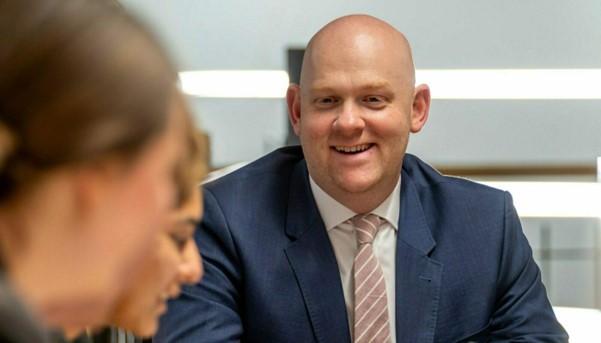Daring Greatly, Striving Valiantly
Posted on 17th Feb 2025 in School News
In terms of giving it a go, Tom Rimmer certainly practices what he preaches. He started his career running sport and activity camps, before training to become a teacher and deciding initially that it wasn’t for him. “I then spent six months skiing as a ski guide in the alps,” he reveals. “That six months turned into two years. When I came back, I started working for a travel company but it became quickly apparent to me that if I was hit by a bus on the way to work, someone else would be in my chair by the end of the day. It sounds haughty, but I was making no difference to the world.”
And so, a return to teaching was eventually made, along a path which would lead to LWC. “You get the privilege of working with the end product in this job”, he explains. So many of my colleagues, parents, prep and primary schools have put in time and effort for these kids and it all crystallizes here. It’s like finishing a jigsaw. And when they leave here, they keep in touch with us and that’s never stopped being a real privilege for me.”
And in terms of his own experience influencing the advice that he offers his LWC Sixth Formers?
“I say to them, ‘don’t start a career at 21. Don’t commit to a 50-year path’. I fundamentally disagree with the nature of careers, which is why we renamed the Careers Department, ‘Futures’. It’s not about helping kids to prepare to be lawyers or bankers. It should be about preparing for a future that you create for yourself. The future isn’t going to happen to you, you make your own future. If you’re scared of the future, then you don’t stand any chance of being excited by it.”
In terms of what visitors will see, Mr Rimmer concludes, “Any visiting parent should see what they want their 16-year-old, their 13-year-old, their 11-year-old to become.”
Up to 20 per cent of UK Sixth Formers attend an independent school for the final two years of their formal education.
But what was once a decision made to try and secure the best grades, is now a more holistic process. LWC’s Head of Sixth Form, Tom Rimmer believes the College is ahead of the curve in designing a Sixth Form fit for purpose in an excitingly ever-changing world.And chairs are an important factor.
“I want students to get a tangible feeling that life is different in Sixth Form,” he explains. “It should feel different. We developed Zanetas (LWC’s open plan Sixth Form centre, set over two floors) with this in mind. The definition of integrity is doing the right thing when no-one’s watching. I wanted to create an environment where, when no-one was watching, Sixth Form would get out their laptops. I wanted a working environment that felt 21st century. It should feel like a university space and a café was central to that. It was important to have upholstered and not plastic chairs, tables that faced each other. I wanted them to feel comfortable. When visitors come in, they don’t see kids throwing rugby balls around or napping, they see kids getting on with some work or having a coffee, sitting with each other. I think when most students go off to university or somewhere else, they’re more likely to say ‘this is a bit like school’ as opposed to finding themselves in an alien environment, which is how I felt when I went to university.”
“It’s not about helping kids to prepare to be lawyers or bankers. It should be about preparing for a future that you create for yourself. The future isn’t going to happen to you, you make your own future. If you’re scared of the future, then you don’t stand any chance of being excited by it.”
—Tom Rimmer
The 200-strong LWC Sixth Form also presents some opportunities when compared to other further education offerings. “What I say routinely to kids going off to college is that they’re going to be in a year group of 1000,” continues Mr Rimmer. “Tutors will take weeks to know your name, if ever. You might meet ten per cent of your year group if you’re lucky, based upon who you sit next to in a lecture. This Sixth Form creates a culture where you’re constantly interacting with different people, who have different values. This place gives students permission to be the best version of themselves.”
Looking to the next step is a crucial part of the LWC Sixth Form strategy. “I often say that on your first day in Sixth Form, you need to be thinking about your last,” Mr Rimmer adds.

It’s almost certainly no coincidence that in the (nearly) two years since the multi-million-pound redevelopment incorporating the Zanetas Sixth Form project, A-level results at LWC have become record-breaking. In 2024, 51% of A-level results were A*-A grades, with 76% A*-B. But it isn’t just about grades….or chairs.
“Lots of schools talk about shaping personalities,” Mr Rimmer continues. “They talk about realising potential. I think all of that is nonsense. I think the kids have it in them. Schools don’t shape it. I think we’ve just got to give them permission to be the adults they’re trying to become.”
But it’s all a difficult balancing act. On what does Mr Rimmer measure his success?“If you were to ask any Sixth Former how they would measure their own success, they would say grades and I don’t think we should be shy about that,” he reasons. “But it’s our job to help them work out for themselves, which grades and in which subjects. The reason I think this is one of the best jobs in school is because you get to work with very individual young men and women, who are setting themselves very personal, emotive, meaningful life goals.”
It’s the setting of these life goals, of ‘widening worlds’ and encouraging students to think more broadly about the future, which sees some of that more holistic approach kicking in.
“It’s about exposing them to as many things as possible,” Mr Rimmer points out. “That means playing in a sports team, being part of a play, boarding occasionally, going to a law or medicine networking event when they don’t really know what they want to do. The message that Sixth Formers get from me most often, is inspired by the Theodore Roosevelt quote about the man in the arena. It’s about daring greatly and striving valiantly. That speech is about never being one of the cold and timid souls who never know victory or defeat. You’ve got to be in the arena giving it a go and it’s better to fail than never to try.”

In terms of giving it a go, Tom Rimmer certainly practices what he preaches. He started his career running sport and activity camps, before training to become a teacher and deciding initially that it wasn’t for him. “I then spent six months skiing as a ski guide in the alps,” he reveals. “That six months turned into two years. When I came back, I started working for a travel company but it became quickly apparent to me that if I was hit by a bus on the way to work, someone else would be in my chair by the end of the day. It sounds haughty, but I was making no difference to the world.”
And so, a return to teaching was eventually made, along a path which would lead to LWC. “You get the privilege of working with the end product in this job”, he explains. So many of my colleagues, parents, prep and primary schools have put in time and effort for these kids and it all crystallizes here. It’s like finishing a jigsaw. And when they leave here, they keep in touch with us and that’s never stopped being a real privilege for me.”
And in terms of his own experience influencing the advice that he offers his LWC Sixth Formers?
“I say to them, ‘don’t start a career at 21. Don’t commit to a 50-year path’. I fundamentally disagree with the nature of careers, which is why we renamed the Careers Department, ‘Futures’. It’s not about helping kids to prepare to be lawyers or bankers. It should be about preparing for a future that you create for yourself. The future isn’t going to happen to you, you make your own future. If you’re scared of the future, then you don’t stand any chance of being excited by it.”
Tempted by the idea of becoming part of the LWC Sixth Form? You’re welcome to join us for our Sixth Form Open Morning on Tuesday, 4th February at 9.30am. You can reserve your place here.
In terms of what visitors will see, Mr Rimmer concludes, “Any visiting parent should see what they want their 16-year-old, their 13-year-old, their 11-year-old to become.”
We look forward to meeting you.